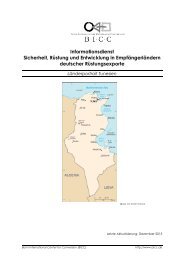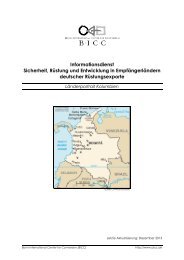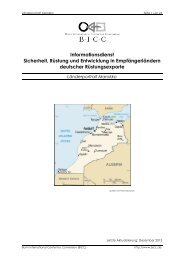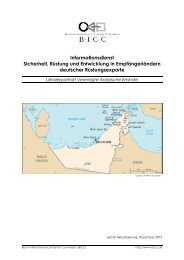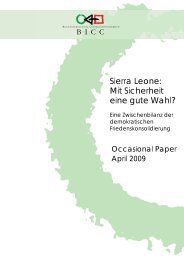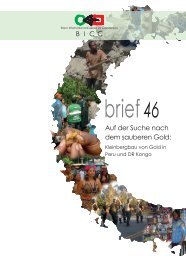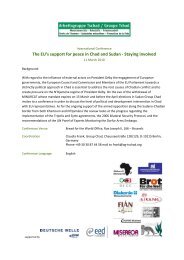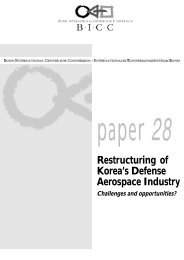English - BICC
English - BICC
English - BICC
You also want an ePaper? Increase the reach of your titles
YUMPU automatically turns print PDFs into web optimized ePapers that Google loves.
Why did<br />
decommissioning<br />
occur?<br />
Although weapons had a political value<br />
for Republicans, the leadership was<br />
also aware of the costs accrued from<br />
delaying on disarmament. The failure<br />
to decommission periodically<br />
engendered unwelcome pressure from<br />
the British and Irish governments; it<br />
also helped fracture Unionism to such<br />
an extent that the institutions of the<br />
Belfast Agreement would themselves<br />
be imperilled. The political value of<br />
holding on to weapons centred on<br />
easing the Republican movement’s<br />
arduous transition, but this did not<br />
mean that arms would need to be<br />
retained indefinitely. If the question of<br />
decommissioning could simply be<br />
stretched out for as long as it is<br />
advantageous, then the grassroots<br />
could be reassured through the period<br />
of ideological adjustment during which<br />
their recalcitrant stance on<br />
disarmament could be quietly<br />
deconstructed by the leadership.<br />
Republicans could seek concessions on<br />
issues such as policing or<br />
demilitarisation in return for gradualist<br />
movement on decommissioning. These<br />
advances, alongside the continued<br />
electoral growth of Sinn Fein, would<br />
improve morale at the movement’s<br />
base, making actual decommissioning<br />
all the more likely.<br />
Republican movement on disarmament<br />
was clearly discernible from May 2000;<br />
the inspection of several arms dumps<br />
amounted to a designation of these<br />
weapons for actual decommissioning at<br />
an unspecified future date. In response<br />
to this, a more propitious framework<br />
for decommissioning was developed by<br />
the two governments—<br />
decommissioning was increasingly seen<br />
as being linked to other issues of<br />
security such as demilitarisation and<br />
policing.<br />
Perhaps the greatest boost to<br />
decommissioning was given by the<br />
electoral results of June 2001. In these<br />
elections Sinn Fein nosed ahead of the<br />
SDLP to become the largest Nationalist<br />
party. Simply put, Republican<br />
bullets have been decisively superseded<br />
by the ballot as a political tool.<br />
Weaponry has no real use and may<br />
actually be an impediment to further<br />
electoral growth; it certainly presents a<br />
clear danger to the Belfast Agreement<br />
which Sinn Fein supports.<br />
It may be helpful to revisit certain<br />
tenets of Republican military strategy<br />
to assess just how far they, and the<br />
peace process, have come. Republican<br />
violence had several components. The<br />
first component was to act as a costly<br />
irritant to the British state. The second,<br />
to draw attention and publicity to the<br />
question of partition, a form of<br />
propaganda by deed. The third, to foil<br />
attempts by the British, Unionists, and<br />
constitutional Nationalists to reach an<br />
internal settlement. IRA violence could<br />
act as a partial veto on any prospective<br />
settlement; it tended to act as a<br />
corrosive and partial solvent on any<br />
possible rapprochement. The attempt<br />
to harry and harass the British until<br />
they withdrew from Ireland failed as<br />
the state simply dug itself in for the<br />
‘Long War’.<br />
Armed propaganda is unnecessary—<br />
and of course, prone to backfire<br />
bloodily—when Sinn Fein is being<br />
feted by political leaders worldwide for<br />
having moved on to the road of peace.<br />
The partial veto deriving from IRA<br />
activity has now been replaced by the<br />
very real veto inherent in being the<br />
largest Nationalist party. In terms of<br />
traditional Republican strategy, guns<br />
are of no use and only serve to expose<br />
Republicanism to political attack from<br />
its opponents. The electoral success<br />
of Sinn Fein has proved the efficacy<br />
of Sinn Fein’s peace strategy and<br />
has given them the political space<br />
to disarm without appearing to have<br />
surrendered.<br />
B·I·C·C<br />
conclusions<br />
These internal circumstances favouring<br />
an act of decommissioning were<br />
already crystallising when unforeseen<br />
external factors greatly accelerated the<br />
process. Revelations about IRA<br />
involvement in the training of the<br />
Marxist FARC paramilitaries in<br />
Colombia soured Republican relations<br />
with the US government and large<br />
swathes of Irish America. Soon after,<br />
this embarrassment was compounded<br />
by the September 11 attacks on New<br />
York and Washington. To be associated<br />
with an organisation which the US<br />
State Department viewed as terrorist,<br />
and to have the residual taint of<br />
terrorist methods, threatened to place<br />
Republicanism outside the political<br />
pale. Although these circumstances<br />
underlined the need for<br />
decommissioning within Republican<br />
thinking and accelerated its progress,<br />
the process was already underway.<br />
Loyalism and<br />
decommissioning<br />
At first glance, the prospects for<br />
Loyalist decommissioning do not look<br />
bright. The political outlook within<br />
Loyalism differs from that of<br />
Republicans on the merits of the peace<br />
process, and appears less consistent.<br />
IRA decommissioning was fuelled by a<br />
strong adherence to the survival of the<br />
institutions of the new political<br />
dispensation; the political space to<br />
decommission was created by their<br />
electoral success.<br />
In contrast, many Loyalists feel that the<br />
new dispensation has done little for<br />
them or the working class areas in<br />
which they live. Loyalism’s political<br />
concerns, the thinking goes, have been<br />
overshadowed by the more media<br />
savvy and electorally successful Sinn<br />
Fein. The Loyalist presence in the<br />
electoral arena is weak, and thus does<br />
not act as a powerful incentive to<br />
relinquish weaponry. The PUP has only<br />
two seats in the Assembly while the<br />
UDP failed to win any Assembly seats<br />
69



